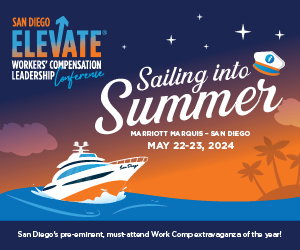Industry Insights
March 7, 2024
Burns: The Commercial Traveler Rule
- State: California
- - 0 shares
A traveling banker was in the course and scope of employment when she died after a night of drinking during a business trip, a California appellate court ruled in an unpublished decision.

Michael P. Burns
In the recent unpublished case of Abraham v. Wells Fargo (2023), the Court of Appeal held that an employee was a commercial traveler, bound by the exclusive remedy of the workers’ compensation system, who died while returning from a bar.
The case hinged on one of the lesser-known concepts in California workers’ compensation: an exception to the going-and-coming rule, known as the commercial traveler rule. The commercial traveler rule provides that an employee who is traveling for business is regarded as acting within the course of employment during travel.
In Abraham, applicant worked on a team of traveling bankers that went to Virginia from California to train call center employees. The training sessions lasted from 7 a.m. to 3 p.m., after which the traveling bankers were to be considered on their own time and free to do whatever they wanted.
Wells Fargo arranged for and paid for the trip, which included airfare, lodging and rental cars. Each employee had a purchasing card to pay for expenses and meals.
The hotel where the applicant and her co-workers stayed provided a complimentary alcohol service during its happy hour. One evening, after the training had ended, the applicant and two of her colleagues drank alcohol in the lobby of the hotel and then went to dinner at a karaoke bar. They traveled using one of the rental cars provided by the employer. At the bar, they drank and, when returning to the hotel, the driver of the car crashed into a tree, killing Ms. Abraham. Her parents sued Wells Fargo for wrongful death.
The court dismissed the lawsuit, holding that the applicant was a commercial traveler and therefore subject to the exclusive remedy of the workers’ compensation system. The “commercial traveler rule” provides that a traveling employee is regarded as acting within the course of employment during travel for the employer’s business.
“His acts in traveling, procuring food and shelter are all incidents of the employment, and where injuries are sustained during the course of such activities, the Workmen’s Compensation Act applies,’” according to a 1956 decision in Wiseman v. Industrial Acc. Com.
The commercial traveler doctrine applies workers’ compensation coverage not only to the travel, “but also to other aspects of the trip reasonably necessary for the sustenance, comfort and safety of the employee,” according to LaTourette v. Workers’ Comp. Appeals Bd. (1998).
Because Abraham was an employee of Wells Fargo traveling for the employer’s business, she was a commercial traveler at the time of her death and her conduct of traveling and procuring food, including drinks, fell within the conditions of her employment.
The court also rejected plaintiff’s claim that Abraham was engaged in a purely personal undertaking when she died because she was drinking after-hours at a bar. When an employee engages in purely personal activity not contemplated by the employer, the employee may be found to have made a material departure from the course of employment and, therefore, not within the course of employment.
But in Abraham, the fact that decedent and her colleagues drank alcohol and stayed out late was of no consequence, according to the court, because one of the purposes of the trip was to network with other bankers. The team was encouraged to dine and spend time together. While the employer did not pay for the alcohol, it also did not prohibit its consumption.
The Abraham case illustrates the fine — and often befuddling — distinction between compensable injuries sustained during business trips and noncompensable injuries that were caused by the employee’s material deviation. Courts have held that some leisure time activity, such as going to a restaurant or bar, is incidental to an employer’s requirement that an employee be away from his home base for an extended period and is within the “course of employment.”
The Abraham case also reminds us that the commercial traveler rule is an exception to the going-and-coming rule, which itself is an exception to Labor Code 3600, which requires that injuries must occur arising out of and in the course of employment to be compensable.
In other words, the commercial traveler rule brings employees under the workers’ compensation system when they are injured while on a business trip. Moreover, there is large latitude provided by the courts in assessing whether an employee’s personal conduct while on a business trip is a material departure from employment. Even alcohol consumption is not, by itself, insufficient in most cases to defeat a business traveler claim.
Conclusion
When analyzing claims with traveling employees, claims professionals should carefully examine the employer’s personnel handbooks when there is a question of whether a worker's conduct on a business trip constitutes a material deviation. Did the travel documents or policy prohibit the consumption of alcohol while on business trips? If so, did the employer enforce that prohibition?
The testimony of co-workers and supervisors is similarly important. What was the understanding conveyed to the employees about the business trip? Were they encouraged to dine or socialize with clients or co-workers? Were purely personal activities allowed as long as they were related to the purpose of the business trip?
A thorough investigation may uncover evidence finding a material deviation that may preclude a successful claim.
Michael Burns is a partner at Bradford & Barthel’s San Jose location. This entry from Bradford & Barthel's blog appears with permission.
Advertisements
Columns
- Langham: Uniformity in Regulations 04/25/24
- Kamin: Expanding the Good-Faith Personnel Action Defense 04/24/24
- Moore: Reciprocity Adds Authority 04/23/24
- Montgomery: Sedgwick Tries PPO Discount for Med-Legal (Again) 04/19/24
- Kamin: More Policy Exclusions Would Reduce Losses 04/18/24
- Phillips: It's All Settled 04/17/24
- Snyder: Public Benefit Rules Have Changed, but It Might Not Make a Difference 04/12/24
- Headrick: Clearing Up a Common Misconception 04/11/24
- Snyder: Litigation Guidelines Should Define Four Settlement Triggers 04/10/24
- Kirsch: Depositions of Comp Carrier Employees After Intervening in Third-Party Actions 04/09/24
- Wilson and Bennett: Could AI Have Prevented the Opioid Crisis in Workers' Comp? 04/08/24
- Moore: Pandemic Effect Over in March 2027. Really? 04/05/24
- Geaney: A Brief History of Our State's Workers' Compensation Act 04/04/24
- Kamin and Larres: Significant Panel Decision Clarifies Recon Confusion 04/03/24
- Gelman: Exposed to 'Forever Chemicals' 04/02/24
- Montgomery: Cyberattack Delays Payment of San Francisco Bills 04/01/24
- Young: Indoor Heat Regs in Turmoil 03/29/24
- Langham: Shootings and Compensability 03/27/24
- Geaney: Third-Party Liens Not Always Due Right Away 03/26/24
- Larres: State Supreme Court Denies Review of Our Appellate Win 03/25/24
Now Trending
- Workers' Compensation News
-
Calif. DWC
Launches Portal for QME…
Posted on Apr 24, 2024Dr. Ron Perelman says: “The problem is that most QMEs are older docs. Many are semiretired.…”Kimberley J Pryor says: “I had planned to post a well constructed comment, but I stopped…”
-
Calif. Worker Gets
Benefits for Crash Despite Leaving
Job Site Without Employer's…
Posted on Apr 25, 2024
-
Calif. Committee
Passes Bill to Eliminate Contractor
Comp Coverage…
Posted on Apr 26, 2024Gary Nelson says: “I think Dodd was right in 2022. …”
-
Calif. DWC Updates
Time-of-Hire…
Posted on Apr 23, 2024
-
Calif. Committee
Passes Bill to Expand 4850…
Posted on Apr 22, 2024
-
Calif.
Appropriations Committee Places TD
Bills on Suspense…
Posted on Apr 24, 2024
-
Calif. Newsom Says
Indoor Heat Safety Rules Too
Expensive for…
Posted on Apr 25, 2024
-
Neb. Divided
Supreme Court Reinstates
Occupational Disease Claim for…
Posted on Apr 23, 2024
-
Ore. Worker Can
Request Examination if Carrier
Supports Claim Denial With IME…
Posted on Apr 22, 2024
-
Ark. Worker Not
Entitled to Additional Benefits
After Date of…
Posted on Apr 22, 2024
Jobs
Upcoming Events
May 5-8, 2024
Risk World
Amplify Your Impact There’s no limit to what you can achieve when you join the global risk managem …
May 13-15, 2024
NCCI's Annual Insights Symposi
Join us May 13–15, 2024, for NCCI's Annual Insights Symposium (AIS) 2024, the industry’s premier e …
May 13-14, 2024
CSIA Announces the 2024 Annual
The Board of Managers is excited to announce that the CSIA 2024 Annual Meeting and Educational Con …
Social Media Links
c/o Business Insurance Holdings, Inc.
Greenwich, CT 06836





No Comments
Log in to post a comment